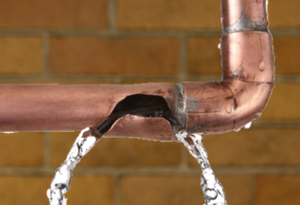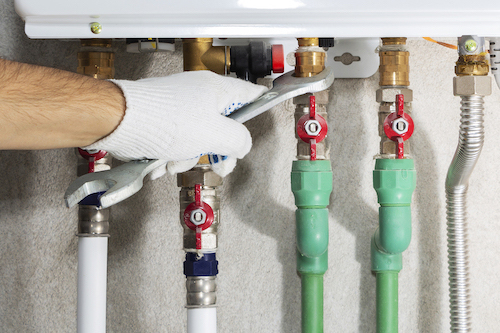The Importance of How to Turn Off Your Water Supply When Dealing With a Burst Pipe
The Importance of How to Turn Off Your Water Supply When Dealing With a Burst Pipe
Blog Article
We have found this great article pertaining to How to Shut off Your Water When Pipe’s Burst directly below on the net and felt it made perfect sense to share it with you in this article.

You have to understand how to switch off your primary water line if you suffer from a ruptured pipe. Do not await a plumbing emergency prior to finding out exactly how to get this done. Besides, other than emergency leakages, you will need to shut off your major water valve for plumbing repair services or if you leave for a lengthy trip. Learn even more about it in this small overview.
Must This Constantly Be Shut Off?
Besides emergencies, repairs, or long holidays, you may not need to turn off the main shutoff. As an example, if only one fixture has concerns, you can switch off the branch valve in that place. By doing this, you can still make use of water in other parts of your house. For ideal outcomes, call a trusted plumber for emergencies.
Why Must You Close the Main Line Off?
Familiarizing on your own with just how your mainline activates as well as off can save you during an emergency. For instance, when a pipe unexpectedly bursts in your residence, you'll be besieged with panic. Therefore, you can readily close the shutoff off and protect against even more damages if you know what to do. In addition, closing this off assures you don't need to manage an abrupt flooding in your home.
On top of that, closing and opening up the shutoffs every so often guarantees they don't obtain stuck. It is also the most effective time for you to examine for rust or other broken links. Moreover, make it an indicate inform other member of the family on what to do. This makes normal maintenance and taking care of emergencies so much simpler. You can possibly conserve on your own hundreds of dollars in repairs.
Where is This Main Valve Found?
The primary water line supply can differ, so you might require to locate time to figure out where it is. However, when your home is getting drenched due to a burst pipe, you don't have the luxury of time throughout an emergency. Thus, you must plan for this plumbing dilemma by finding out where the shutoff is located.
This shutoff valve could look like a round shutoff (with a lever-type manage) or a gate shutoff (with a circle faucet). Placement relies on the age of your home as well as the environment in your location. Check the adhering to typical places:
Pipe Burst? Here's What to Do Next
There's nothing worse than that sinking feeling that sets in when you notice water dripping from your ceiling or — worse — gushing from a broken pipe. Many homeowners find themselves panicking as they start to tally up the water damage repair costs. Fortunately, a bit of forward planning can help you avert a total plumbing disaster.
What Happens When a Pipe Bursts?
There are several reasons that your pipes could burst, though one of the leading culprits is ice. When the temperature outside dips below freezing, the water in your pipes can freeze, too. When water freezes, it expands, putting significant pressure on your pipework.
When your pipes freeze for the first time, they may withstand the added pressure without any adverse effects. However, allowing your pipes to freeze repeatedly will gradually weaken them as they expand and contract, eventually causing them to burst or crack.
Corrosion High water pressure Blockages Invading tree roots How Do You Know If Your Pipes Have Burst?
When you mention broken pipes, most people imagine water gushing dramatically from the wall or ceiling. However, the first signs are often subtler. It's a good idea to look out for the less obvious symptoms of a major leak.
When a water pipe bursts, moisture starts seeping into your floors, ceilings and insulation, causing significant damage. Eventually, mold and mildew start to flourish, creating a potentially hazardous living environment. If you find yourself wading through puddles of water on the floor or can hear water bubbling inside the walls, you won't be left in any doubt as to whether you have a burst pipe.
Unexplained Hike in Water Bills
If your water bill suddenly shoots up for no apparent reason, it could be a sign of a burst water main. As water seeps out of the pipe, it sends your water usage sky high. Any unexpected increase in your water bills warrants further investigation.
Reduced Water Pressure
A broken water main or burst pipe means your system must work harder to maintain a supply to your faucets and other fixtures. Therefore, reduced or uneven water pressure could be a sign that you've got a leak. While there are a few potential causes of dodgy water pressure, it's important to find the reason quickly to prevent water damage.
No Flow
Reduced water pressure is inconvenient enough, but you may suddenly find that you have no water flow at all. One of the most likely reasons for a complete lack of running water is a frozen pipe. You should defrost your pipes as quickly as possible to stop them from bursting.
If you can access the frozen pipe, you could try defrosting it yourself. Turn on the central heating to around 70 degrees and use a gentle heat source like a hairdryer or infrared lamp to warm the pipe up gradually — never use a blowtorch or other open flame. If the pipe is inaccessible or your efforts aren’t fruitful, call a plumber to defrost the pipes for you.
Damp Patches in Your Home or Yard
As water flows out of a burst pipe, you may notice damp or discolored patches on your walls, floors or ceilings. If the leak happens under a tiled floor, it could make the tiles feel wobbly or unstable.
Don't forget to look for exterior signs of a burst pipe. Depending on the location, you may also see puddles, depressions or wobbly pavement in your yard.
https://www.homeserve.com/en-us/blog/home-improvement/frozen-pipe-burst/

As a reader on Got a Burst Pipe? Turn Off Your Main Water Valve, I think sharing that segment was really helpful. Enjoyed our posting? Please share it. Help another person check it out. Many thanks for going through it.
Ensure plumbing integrity; reach out. Report this page